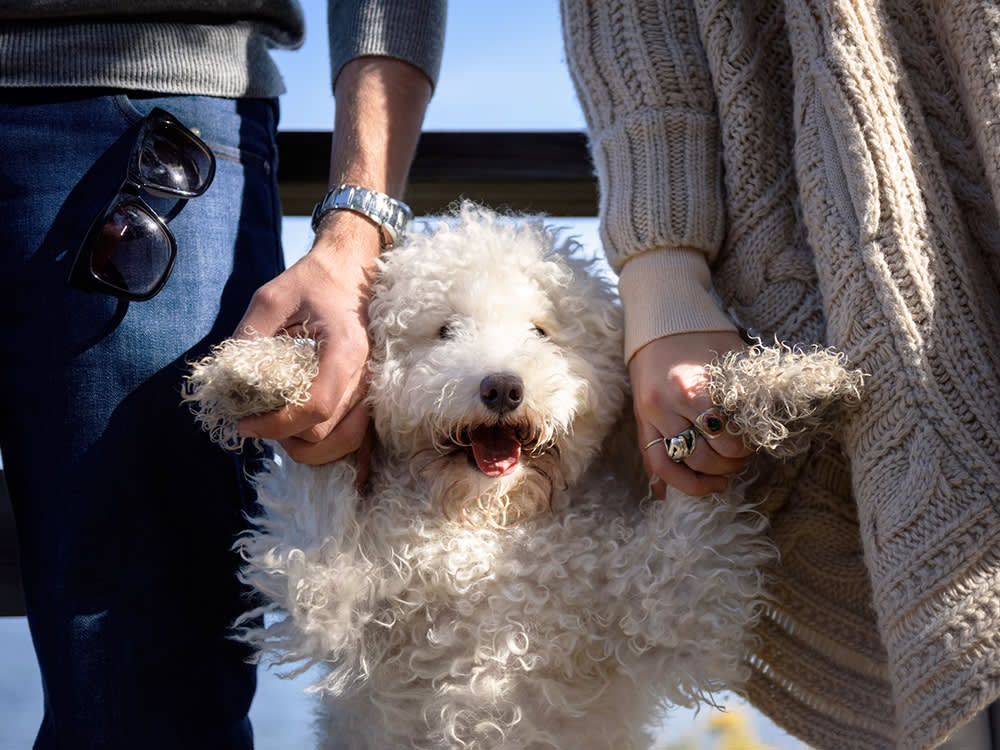Who Keeps the Dog in a Divorce?
Legal experts weigh in on developing pet custody issues.
We all know that divorces and breakups are messy. It’s especially difficult with dogs are part of what is shared between two newly separate households. What happens to a dog during a divorce and how are those decisions made?
One emotional battle made international headlines as a divorcing Canadian couple could not agree over custody of their three dogs. The wife asked the judge to treat the dogs like children, awarding custody to her with visitation for the husband. Clearly frustrated with the request and the case’s drain on limited judicial resources, Justice Richard Danyliuk of Court of Queen’s Bench for Saskatchewan wrote a lengthy decision that began by declaring his love of animals. “Dogs are wonderful creatures.” He then went on to say, “Many dogs are treated as members of the family with whom they live. But after all is said and done, a dog is a dog. At law it is property, a domesticated animal that is owned. At law it enjoys no familial rights.” The same is true in most jurisdictions across the United States.
So, who gets the dog in a divorce?
Animal law specialist Adam Karp of Bellingham, Wash., is familiar with divorces involving dogs. Because courts are overburdened, judges are reluctant to tackle issues they don’t have to, including custody of pets. Divorce trials are also low on the judicial popularity list, and asking for a ruling on pet custody sometimes pushes the limits of their patience. “The inexact fit of child custody statutes calls for ingenuity, what some reject as a type of ‘judicial activism.’” Karp says. “Judges may look for a cookie-cutter approach to quickly dispose of such cases, and categorizing an animal as mere ‘property’ allows that. But these issues go to the core of our hearts and hearths.
Closer to home, I spent more than 30 years practicing family law in Washington and Idaho, focusing much of my practice on representing the interests of children whose parents were fighting over custody and visitation. For most of those years, I observed that family pets were the forgotten victims of divorce. Very rarely were they mentioned in property distributions, even though in both Washington and Idaho, as in most states, pets are considered property and so could have been listed along with household furnishings, vehicles and retirement benefits. If a divorcing couple had kids, typically their pets stayed with the parent with whom the children were going to reside the majority of the time.
How much do you spend on your pet per year?
More difficult are the cases where there aren’t any children and the couple lived together without the legal status of marriage. When they break up, they generally must reach agreements on dividing property, including pets, without court assistance. Perhaps they acquired a dog while together. Both bonded with the dog — and the dog with them — but while they’ve decided to break up with each other, neither wants to break up with the dog. What to do?
What’s best for the dog?
Litigation is expensive and traumatic for all involved. “This is my area; I practice animal law,” says Karp. “While I do not endorse litigating custody disputes in a week-long trial while enlisting multiple experts and character witnesses, chastisement, as done by the Saskatchewan judge, does nothing to help the quite real emotions and investments made by the parties to the litigation. And, yes, there is a risk (as in many family law disputes) for litigators to turn such a dispute into a clownish fiasco. A sense of proportion and moderation is critical. But more importantly, all involved should do their best to objectively ascertain the perspective of the one who does not get to take the stand — giving voice to the animal’s best interests, something we often currently miss.”
Yet, there’s hope for positive change in this age-old legal approach of treating pets as property in family law cases. In 2017, statutory provisions with regard to pets and divorce in Alaska became effective, requiring courts to consider “the well-being of the animal” owned by the parties in final agreements or judgments. The provisions allow for sole or joint ownership post-divorce, and provide a broad a definition of an animal as “a vertebrate living creature not a human being,” which would include almost any companion animal or livestock a couple might own. Similarly, in 2019 California divorce laws have changed, putting dogs’ best interests first when making legal divorce decisions.
This language opens the door for Alaskan and Californian courts to make custody, visitation and cost-sharing provisions for family pets and any other animals owned by a couple, similar to those made for children. It may also allow the court to appoint special advocates for pets in particularly contentious cases, just as it does for children.
Resolving through mediation.
What if you don’t live in Alaska, California or a jurisdiction with similar statutes? If, instead of reaching agreement, the parties go to trial and leave the issue for the court to decide, the judge’s only option in almost all states is to award the property — the pet — to one party or the other. There are no provisions for visitation or shared cost because the law allows a court to make such awards only for children, not animals.
However, divorcing couples can agree to many things that courts can’t force them to do—either on their own or with the help of a mediator—and if those agreements are included in the divorce decree, they’re legally enforceable if one party breaches the terms.
Any good family law attorney will recommend trying to settle a case outside of court to avoid the trauma and expense of trial, and this is especially true when it comes to pets. You might get lucky and find a judge more sympathetic than the judge in Saskatchewan, one who will award custody based on the best interests of the pet. But without a legal basis for that award, it’s a risk, because the decision could easily be appealed, adding more trauma and expense.
“Resolving custody disputes through a third-party neutral or even mediation or arbitration might be best,” Karp says, because mediation allows everyone to focus on the best interests of the pet. “I was once asked to mediate a cat custody dispute,” he continued. “I brought the parties around to considering the cat’s perspective, thinking about who could best provide for him and [asking them] to suspend vengeful thoughts for one another.”
What if you’re not married but in a relationship and have (or want to add) pets?
Some couples come up with informal separation agreements. For example, they agree to alternate custody, meeting weekly to make the exchange. It might work for a while, but just as with shared custody of children, all it takes to upset the plan is for one person to move a significant distance away (making traveling to exchanges a burden both in time and expense) or to become involved with a new human (setting off a storm of jealousy).
In a Washington state case, a couple who had lived together and then separated agreed to share custody of their dog. This arrangement was stressed when one of them moved, and broken altogether when the woman became involved with a new man. The former boyfriend not only refused to return the dog at the scheduled time, he took the dog and disappeared. The woman hired a private investigator to locate her dog, and an attorney to bring legal action to regain possession of him.
The case opened with a temporary court order requiring both parties to “possess and care” for the dog on a week on/week off schedule pending trial. While it was shown at trial that both had been very involved in all aspects of the dog’s care, the court determined that the woman was the owner and possessor of the dog— the property—but would have to reimburse her former boyfriend for the amount he had originally paid toward the dog’s purchase. (The boyfriend’s unwise decision to hide the dog likely influenced the judge’s decision to deny him guardianship.)
Creating a dog divorce agreement.
What can you do to avoid a custody dispute if you split up? If your state’s laws allow, you can enter into a binding and enforceable custody agreement (if cohabitating), a prenuptial agreement (if contemplating marriage), or a separate property or community property settlement agreement (if already married). Any of these contracts can set forth who is the pet’s owner if a couple breaks up; whether visitation will be allowed, and on what terms; and whether they’ll share costs for boarding, daycare and vet expenses while together and post-split.
If you don’t want to enter into such a formal agreement, be sure to maintain very clear records that document any pet-related expenses you paid: purchase or adoption fees, licensing, food, training, exercise, boarding, vet care and so on. At least for the foreseeable future in most parts of the country, pets will continue to be treated as property that courts can’t force people to share if they don’t want to.
Given how many households have pets and how integrated they are into our daily lives — they are far more to us than a television or a computer, after all — we can hope that more states will quickly adopt an enlightened approach.








